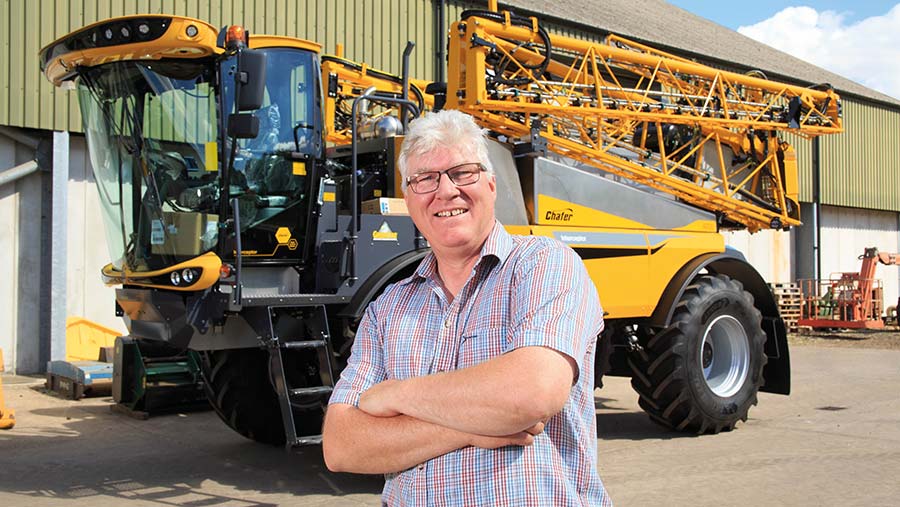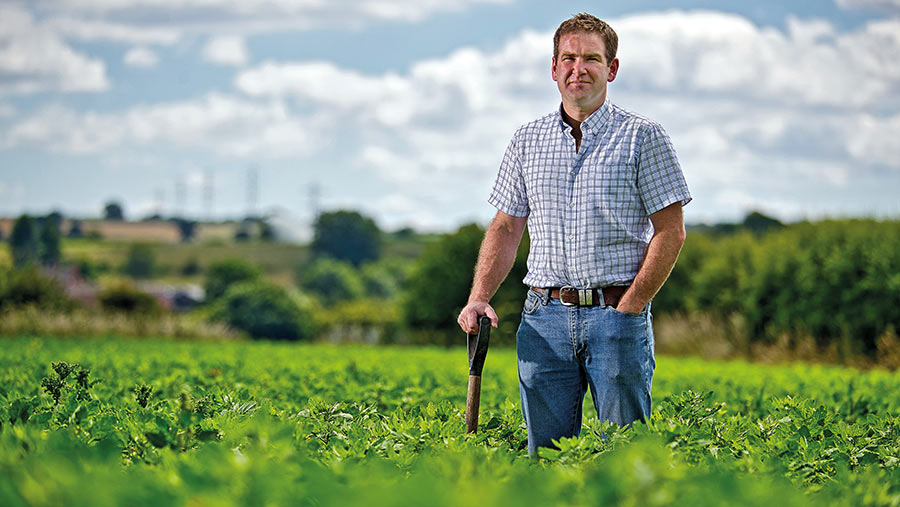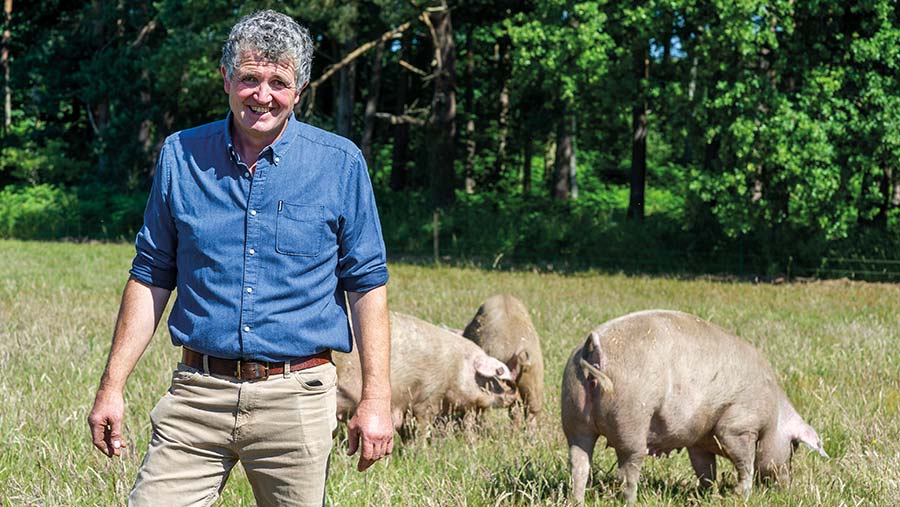Farmers Weekly Awards 2022: Farm Manager of the Year finalists

This year’s farm manager finalists run three very different businesses, but they share a drive for constant improvement and a forward-looking approach as all farming sectors adapt to new regimes, schemes and market demands.
See also: Farmers Weekly Awards 2022: Beef Farmer of the Year finalists
The finalists:
Richard Cross
Oxton Estate, Southwell, Nottinghamshire
Michael Kavanagh
Church Farm, Boningale, Shropshire
Rob McGregor
LSB Pigs, Fakenham, Norfolk
The judges:
Edward Vipond
Last year’s winner
Suzie Horne
Farmers Weekly business editor
Andrew Robinson
Farm manager at Heathcote Farms, Bedfordshire
Richard Cross
Oxton Estate, Southwell, Nottinghamshire

Richard Cross © Tim Scrivener
Richard Cross joined the Oxton Estate as a working farm manager in 2010. He now is manager of the Oxton Farms Trust and Oxton Contracting, a limited company created in 2016 to provide contacting and other services back the trust.
He lists his main challenge on joining as a completely cold handover, with staff who had well in excess of 100 years’ combined service.
About three-quarters of the land is red clay, with the remainder very easy working but drought-prone sand and gravel.
Richard has managed much change since he joined the business and describes himself as a solutions provider. He is very involved in the estate’s two green burial grounds.
He lists his biggest achievements as growing 12t/ha of wheat on exposed marginal fields in 2014, and moving the farming business forward with the gradual introduction of technology.
Innovation
His innovations include proposing and overseeing the construction of 2,200t of on-floor grain storage, completed in 2013, which eliminated the requirement for harvest sales.
He has managed the change from conventional cultivations through min-till and now to strip-till, using a Mzuri drill, which is paying financial dividends in reduced establishment costs and timeliness. He has also introduced a full RTK system on the prime kit.
Following a revision of staff responsibilities, he has introduced a paperless system for recording crop applications.
“This has completely eliminated hours of manual input of completed operations into the management programs,” says Richard.
Variable-rate nitrogen applications have been tried this year, using weekly satellite images of crop biomass.
Crop management
The two soil types dictate cropping, with the heavy land in a conventional rotation of wheat, barley and oilseed rape. This year has seen a switch back to winter malting barley, providing an early entry for oilseed rape establishment.
The number of varieties is kept down to maximise storage opportunities. First wheats are generally high-yielding Group 4s with good disease resistance, followed by a second hard wheat, with both finding good local homes for poultry rations.
Oilseed rape is still his most profitable crop and Richard is sticking with it, aiming to alter establishment to beat flea beetle, despite a total crop loss in 2019-20.
Farming alongside a large shoot is challenging and cropping is adjusted to minimise losses.
The sand land has a maximum output of 7.5t/ha for first wheat, so milling wheats are grown here to maximise output, usually achieving full spec or close to it. Wheat is followed by maize for anaerobic digestion.
Risk
Market volatility is his main risk. Crops are sold conventionally through a handful of main merchants.
Staff are consulted on decisions, especially concerning equipment. The approach to jobs is also discussed, with health and safety paramount.
Work practices are modified to suit the age demographic of staff, which ranges from 40 to 74, with the senior member bringing a different and essential skill set that will be difficult to replace, says Richard.
In five years’ time Oxton will be more diversified, producing more from fewer hectares as more poorer areas are put into environmental schemes, having been identified through data recording.
Richard has extensive involvement in the local community and wider agricultural organisations, as vice-chairman of the Southwell and District Agricultural Society and of Trent Valley Training, a local training group. He has also been a parish councillor for nine years, two as chairman.
What the judges say
Richard manages a very diverse business. He is hands-on, finding solutions for issues arising on the estate. He knows his land well, chooses crops accordingly and communicates well internally and more widely.
Richard Cross summary
The judges liked
- Close management of diverse business, including green burial grounds
- Manages challenging variation in soil type
- No insecticide for two years
- Facts and Basis qualified
- Dealing with succession in the farming staff and estate management
- Long-term view of business strategy
Farm facts
- Diverse 1,090ha estate, mainly arable, with 160ha of woodland and 182ha pasture
- Combinable crops, maize for anaerobic digestion
- Significant green burial sites diversification, a diversification in which Richard is very involved
- 24 residential and commercial properties; golf course under separate management
- Large composting business on site, leased to operator
The numbers
- 2 full-time staff plus manager
- 700ha cropped
- 25ha land let out annually, with irrigation for vegetable production (no brassicas)
- 2 green burial sites
- 2,200t capacity of new grain store
Michael Kavanagh
Church Farm, Boningale, Shropshire

Michael Kavanagh © Richard Stanton
On joining Church Farm in November 2014 to work for the Thompson family, Michael was tasked with creating a profitable and sustainable business without relying on rent from vegetable or root crop growers.
He pressed the reset button, starting a gradual move to no-till.
The introduction of cover crops and lower nitrogen and synthetic input use, alongside diversifying the rotation, have improved soil quality, allowing a move to zero till across most of the farm in 2019.
Wheat yields have reached 10t/ha on certain blocks, which is exceptional for the farm, with only 165kg/ha of nitrogen used.
Michael counts improved soil organic matter as one of his biggest achievements, taking the whole-farm average from 2.5% in 2015 to 3.25% 2021, adding 126,000l/ha of water-holding capacity.
Livestock introduction
He introduced a flock of Lleyn sheep, now at 400 purebreds, fed solely on permanent pasture and lambed outdoors. Lambs are finished without concentrates and all sold to a local farm shop, averaging 15 head a week in 2021.
This year the plan is to move to 700 ewes for a year-round supply.
The changes at Church Farm led Michael to be asked to contract-farm a nearby 320ha holding from September this year. This is alongside a further expansion of 65ha of grass and arable land.
Innovation
The gradual transition to zero till has cut wheat establishment costs (machinery, labour and fuel) to just £25/ha. The farm uses a 130hp four-cylinder, lightweight tractor and a 4m drill, with fuel at just 6 litres/ha.
“Lowering synthetic inputs has been a major part of this jigsaw to continually build soil health, as well as inclusion of cover crops grazed by sheep and a straw-for-muck deal where all incoming muck is composted,” says Michael.
He farms without insecticides, fungicides (except one on wheat at T2), plant growth regulators and bagged phosphate and potash. His soil pH is now stable without the use of lime and the goal is to continue to push yield up and nitrogen down.
A key part of his approach is the biological brews he makes on farm, which is effective in warding off septoria, fusarium, bunt and smut. Each treatment costs £1.50/ha applied.
He lists in-field monitoring of sap pH, nitrogen levels, Brix and laboratory leaf testing as crucial parts of the puzzle.
Marketing
Combinable crops are marketed conventionally. All the wheats are for milling, usually hitting full spec. Oats go for milling, and barley for malting, with quinoa grown on a British Quinoa Company contract.
The lamb price, at a significant premium to average prices, is agreed for the whole year. From next year, a batch will be lambed in January to plug a May to August gap in the farm shop supply.
Until this summer, Michael was the sole farm employee, with combining and hedgecutting done by a contractor, and a student taken on for a month at lambing, alongside casual help – for example, at shearing.
The expansion has allowed him to recruit a recent graduate as a general farmworker, who is keen to learn as much as possible about the regenerative approach.
Michael sees knowledge exchange as a key part of the way he farms and undertakes speaking engagements, including for the AHDB, and visits local schools.
He is a founder member of the Green Farm Collective, set up to monetise carbon and biodiversity. Alongside further reductions in growing costs, Michael sees this as a key part in offsetting the loss of the Basic Payment System.
What the judges say
Michael has an innovative approach to regenerative agriculture, using home-brewed crop nutrients to replace fungicides. His lamb marketing is forward-thinking and he has a great vision for the business.
Michael Kavanagh summary
The judges liked
- Asked to contract-farm significant area for near neighbour, which is a testament to his work
- Increased soil organic matter
- Maintains decent yields without insecticides, fungicides, plant growth regulator or phosphate or potash
- Excellent marketing in profitable sheep enterprise
- Uses What3words app for safety
Farm facts
- 283ha, expanding to 658ha this autumn
- 245ha owned, remainder on contract-farming agreements or grazing licences
- Mainly arable, with 8ha woodland and 34ha permanent pasture
- Mainly sandy loam soils
- Eight let properties
- Mid-tier Countryside Stewardship scheme
- Local bird group results show improved biodiversity
The numbers
- 7.8t/ha Average wheat yield
- 10t/ha Top wheat yield
- 1.6 lambs reared a ewe
- 22kg Average lamb carcass weight
- £97.38 Gross margin a ewe
Rob McGregor
LSB Pigs, Fakenham, Norfolk

Rob McGregor © Jason Bye
Rob manages two outdoor herds with a total of 1,450 sows, supplying weaners to BQP finishers and, ultimately, to Waitrose and premium ranges elsewhere.
As well as running the sites, his responsibilities include financial planning and investment, in conjunction with the farm owner.
BQP owns the pigs, provides the feed and haulage, and covers vet costs, with LSB Pigs providing the land, labour, straw, machinery and equipment.
Innovation
Helping pioneer new production methods has been an important part of Rob’s work. These include individual farrowing paddocks, batch farrowing and artificial insemination techniques.
After being proven at LSB, several of these developments have become industry-changing innovations.
Products adopted on units throughout the country and overseas include heat-reflective coatings for steel arks, single-piece plastic farrowing arks, clean water drinking tanks and rounded-top plastic farrowing fenders.
Most recently, the units have been moving to five-week weaning, aiming for stronger, healthier, heavier piglets better able to stand transport, requiring less medication and fewer days to finish.
He is also trialling AgBag ensiled sugar beet as an alternative feed, and is working with the AHDB, Anglia Water and Norfolk Rivers Trust on a green cover crop trial.
Clean water tanks have been his most significant innovation, reducing waste and raising intake due to better water quality.
“The changes we have seen in physical performance of the animals since the introduction of these drinkers has been outstanding,” he says.
Performance
Productivity and animal welfare are twin priorities.
Four-week weaning produced 28 pigs reared a sow a year, 13.8 pigs born alive a litter, 11.7 pigs weaned a litter, and 2.35 litters a year. These results are in the top 10% or top-third of nationally benchmarked performance. Early indications from the move to five-week weaning are promising.
The potential deterioration of herd health is the biggest business risk, with biosecurity aimed at keeping disease risk low.
The herd is as closed as possible, breeding its own replacement parent stock with minimal grandparent stock intake.
Staff
Motivating a staff of eight in a repeating routine that also requires close attention to detail in husbandry and practice has its challenges. It’s clear to see that Rob encourages a positive team spirit. He works alongside everyone as often as possible.
Before the Covid-19 pandemic, staff breakfast meetings were held at local farm delis and cafes. These should soon be back on the agenda.
WhatsApp groups are used to include staff and empower them to voice their opinions, when in the past they could have felt excluded from planning and decision-making.
The size of the business offers career progression opportunities. A generous production bonus is paid to all, based on piglet sales at each weaning. There is a progressive training policy and a flexible approach to time off for the unexpected.
“Bigger teams can bring their own range of problems,” says Rob. “It’s important nobody gets the pick of the jobs or, likewise, that the more mundane tasks are left to the same few.”
Streamlining variable costs and looking for opportunities to improve efficiency are a constant, while Rob will continue to embrace new technology and innovation.
The farm engages with AHDB trial work and media content and helps support the RSPCA Assured scheme with an open-door policy and knowledge exchange.
It also tests and develops equipment for an equipment manufacturer.
Rob engages frequently in positive industry print press and radio content, alongside tweeting from @robonthefarm.
What the judges say
Rob is a true leader in the pig sector. He manages a large enterprise extremely efficiently and has an excellent understanding of risk management and cost control in this profitable business.
Rob McGregor summary
The judges liked
- Innovative, involved in many projects to benefit his business and the wider pig sector
- Excellent staff management
- Constantly seeking marginal improvements
- Long-term view and strong partnership
- Ongoing engagement with industry and public groups
Farm facts
- Contract producer of weaner pigs for finishing, ultimately supplying Waitrose and premium ranges at other retailers
- Tenanted farm on large arable estate
- Both units recorded on SmartPig
- Benchmarked and recorded against other BQP units
- Top 10% and top-third performance
The numbers
- 1,450 Number of sows
- 2.35 Litters a year
- 8 Staff in addition to manager
- 65ha Area of land for pigs within a larger arable rotation
- 34 Number of years Rob has worked with outdoor pigs
- 27 Years with current employer
Sponsor’s message
 “We value the recognition this award bestows on managers who lead their teams with great skill, experience and vision, while ensuring the safety of each worker, protecting their employer and the business they are helping to build.”
“We value the recognition this award bestows on managers who lead their teams with great skill, experience and vision, while ensuring the safety of each worker, protecting their employer and the business they are helping to build.”
Oliver Dale, managing director
